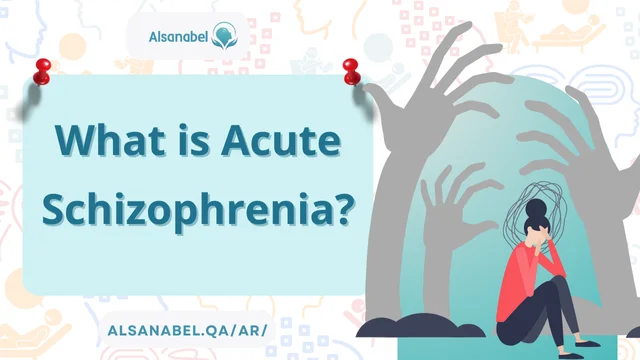
Schizophrenia is a chronic and severe mental health disorder that affects how a person thinks, feels, and behaves. While many are familiar with its chronic form, acute schizophrenia represents a more intense and sudden manifestation of the condition. Characterized by rapid onset and severe symptoms, acute schizophrenia requires immediate attention and specialized care. This article explores the causes, symptoms, and management strategies for acute schizophrenia, providing a comprehensive understanding of this challenging condition. By delving into severe schizophrenia symptoms, acute schizophrenia episodes, and treatment for acute schizophrenia, we aim to equip individuals, caregivers, and healthcare professionals with the knowledge needed to address this condition effectively.
What is Acute Schizophrenia?
To begin understanding acute schizophrenia, it’s essential to define what sets it apart from chronic forms. Acute schizophrenia refers to a sudden and intense onset of schizophrenia symptoms, often leading to significant impairment in daily functioning. Unlike chronic schizophrenia, which develops gradually over time, acute schizophrenia episodes can appear abruptly and require immediate intervention.

Key Characteristics of Acute Schizophrenia
- Rapid Onset: Symptoms develop quickly, often within days or weeks.
- Severity: Symptoms are more intense and disruptive than in chronic forms.
- Duration: Acute episodes can last for a short period but may recur if not managed properly.
Distinguishing Acute from Chronic Schizophrenia
- Onset: Acute schizophrenia has a sudden onset, while chronic schizophrenia develops gradually.
- Symptoms: Acute episodes are marked by more severe and disruptive symptoms.
- Treatment: Acute schizophrenia often requires immediate and intensive treatment, whereas chronic schizophrenia focuses on long-term management.
Causes of Acute Schizophrenia
The exact cause of acute schizophrenia remains unknown, but research suggests that a combination of genetic, biological, and environmental factors contributes to its development. Below, we explore these factors in detail.
Genetic Factors
- Family History: Having a close relative with schizophrenia increases the risk.
- Genetic Mutations: Certain genes may predispose individuals to the condition.
Biological Factors
- Neurochemical Imbalances: Dysregulation of neurotransmitters like dopamine and glutamate.
- Brain Structure: Differences in the size and activity of certain brain regions, such as enlarged ventricles or reduced gray matter.
Environmental Factors
- Stressful Life Events: Trauma, loss, or significant life changes can trigger acute episodes.
- Substance Abuse: Drug or alcohol use may exacerbate symptoms or trigger onset.
- Prenatal Exposure: Infections, malnutrition, or stress during pregnancy.
Symptoms of Acute Schizophrenia
The severe schizophrenia symptoms associated with acute schizophrenia can be overwhelming and disruptive. Below, we break down the symptoms into positive, negative, and cognitive categories.
Positive Symptoms
Positive symptoms refer to behaviors or experiences that are added to a person’s normal functioning. These include:
- Hallucinations: Hearing, seeing, or feeling things that are not real. Auditory hallucinations (hearing voices) are the most common.
- Delusions: Strong beliefs that are not based in reality, such as paranoia or grandiosity.
- Disorganized Thinking: Incoherent speech or difficulty organizing thoughts.
- Abnormal Motor Behavior: Unusual or repetitive movements, catatonia, or agitation.
Negative Symptoms
Negative symptoms involve the absence or reduction of normal behaviors and emotions. These include:
- Flat Affect: Reduced emotional expression, often appearing emotionless.
- Social Withdrawal: Lack of interest in social interactions or activities.
- Avolition: Decreased motivation to initiate or complete tasks.
- Anhedonia: Inability to experience pleasure from activities once enjoyed.
Cognitive Symptoms
Cognitive symptoms affect thinking processes and include:
- Memory Problems: Difficulty retaining or recalling information.
- Attention Deficits: Trouble focusing or maintaining attention.
- Executive Dysfunction: Challenges with planning, organizing, and problem-solving.
Diagnosing Acute Schizophrenia
Diagnosing acute schizophrenia requires a thorough evaluation by a mental health professional. The process typically involves
the following steps:
Clinical Interview
- Symptom Assessment: Discussing the nature, duration, and severity of symptoms.
- Medical History: Reviewing past mental health issues and family history.
Diagnostic Criteria
- DSM-5 Guidelines: Using the Diagnostic and Statistical Manual of Mental Disorders to confirm the diagnosis.
- Rule Out Other Conditions: Ensuring symptoms are not due to another medical or psychiatric condition.
Additional Assessments
- Psychological Tests: Evaluating cognitive and emotional functioning.
- Brain Imaging: In some cases, imaging studies may be used to rule out other causes.
Treatment for Acute Schizophrenia
Effective treatment for acute schizophrenia often involves a combination of medication, psychotherapy, and supportive interventions. Below, we explore the most common treatment options.
Medications
- Antipsychotics: The cornerstone of treatment, these medications help manage positive symptoms.
- Mood Stabilizers: Used to address mood swings or co-occurring conditions.
- Antidepressants: Prescribed cautiously to manage depressive symptoms.
Psychotherapy
- Cognitive-Behavioral Therapy (CBT): Helps individuals identify and challenge distorted thoughts.
- Family Therapy: Involves family members in the treatment process to provide support and education.
- Social Skills Training: Focuses on improving communication and interpersonal skills.
Supportive Interventions
- Case Management: Coordinating care and connecting individuals with resources.
- Vocational Rehabilitation: Assisting with employment and skill development.
- Peer Support: Engaging with others who have lived experience with schizophrenia.
Managing Acute Schizophrenia Episodes
Knowing how to manage acute schizophrenia episodes is crucial for individuals and caregivers. Below, we outline strategies for managing these intense episodes.
Immediate Interventions
- Safety Planning: Ensuring the individual has a support system and access to emergency resources.
- Medication Adjustment: Adjusting or starting antipsychotics as prescribed.
- Safe Environment: Removing access to potentially harmful items and ensuring a calm, supportive environment.
Long-Term Management
- Therapy: Engaging in CBT or other forms of psychotherapy to address symptoms.
- Lifestyle Adjustments: Maintaining a regular routine and avoiding triggers like stress or substance use.
- Support Systems: Building a network of family, friends, and healthcare providers for ongoing support.
Frequently Asked Questions

What distinguishes acute schizophrenia from chronic forms?
Acute schizophrenia is characterized by a sudden and intense onset of symptoms, whereas chronic schizophrenia develops gradually over time.
What are the rapid onset symptoms of acute schizophrenia?
Rapid onset symptoms include hallucinations, delusions, disorganized thinking, and abnormal motor behavior.
How quickly can acute schizophrenia symptoms develop?
Symptoms of acute schizophrenia can develop within days or weeks, making immediate intervention crucial.
What emergency treatments are available?
Emergency treatments may include antipsychotic medications, hospitalization for safety, and creating a supportive environment.
When should one seek immediate help for acute symptoms?
Immediate help should be sought if the individual experiences severe hallucinations, delusions, or is at risk of harming themselves or others.
By understanding acute schizophrenia and knowing how to manage acute schizophrenia episodes, individuals and caregivers can take proactive steps to address this challenging condition. Whether through medication, therapy, or supportive interventions, effective management is possible. This comprehensive guide provides valuable insights into the severe schizophrenia symptoms and the strategies to address them effectively, offering hope and practical solutions for those navigating this complex condition.
%20(2).jpg)

